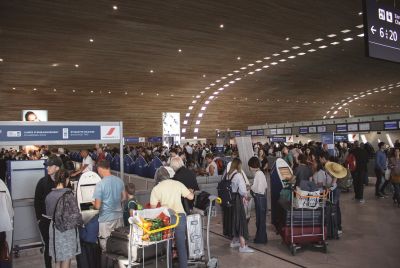Locals Carry Out 'Bedbug Scam' In Athens, Threaten Tourists With Fine Of £427
A police investigation is currently underway against locals in Greece.

Tourists in Athens have been on the receiving end of a bedbug scam in rental apartments, staged by anti-tourism activists, and it involves a hefty fine.
The Greek health ministry has ordered a police investigation against the hoaxers who tried to scare foreign tourists away from Airbnbs in Athens by inventing a bedbug crisis, according to media reports.
The anti-tourism activists gathered outside apartment buildings in the city centre with posters having fake ministry and the city's municipality logos, along with fake signs about the bedbugs. Greece's health ministry has warned that the posters were "absolutely false".
Ministry refutes bed bug hoax in Athens’ Exarchia district https://t.co/vaRanczwjM pic.twitter.com/5gqa6x7ZNq
— Kathimerini English Edition (@ekathimerini) December 5, 2023
The false signs used by the hoaxers were addressed to "dear visitors" in poorly translated English. The signs claimed that the health authorities had asked the local "private guesthouses" to get evacuated "to protect the public health of permanent Greek tenants".
Referring to a made-up bedbug invasion, the posters stated that tourists would face a £427 (€500) fine if they failed to leave their accommodation. The signs also courteously wished the foreigners a pleasant stay in Greece.
The country's health ministry said that it had asked the police to do whatever was necessary to deal with the fraud. It said that "nobody is allowed to terrorise and misinform the public" on public health issues.
Several parts of Greece, especially Athens, are suffering from a housing crisis. With many apartments being used as holiday rentals for tourists, rent is increasing and locals are being pushed out, leaving them helpless and furious.
The housing prices are also surging partially because of government policies that offer foreign investors residence in exchange for property investments.
Tourism plays a significant part in Greece's economy, accounting for a fifth of its annual output and 2023 is expected to be a record year for arrivals.
Greece has not faced any major trouble with the bloodsucking bedbugs that recently invaded France. In September and October this year, travellers shared photos and videos on social media supposedly showing the insects on the Paris local transport system, high-speed trains, cinemas, at Charles de Gaulle airport, among other places.
Having majorly disappeared by the 1950s, bedbugs have returned to daily life in recent decades and have become quite resistant to chemical treatments. The data released by Rentokil in September has revealed that there had been a 65% increase in infestations from 2022 to 2023 in the UK, according to Mirror.
Bedbugs are wingless, oval-shaped, and are around 6mm long and flat in appearance. They can be present in mattresses but also in clothes and luggage and come out at night to feed on human blood. They also often lead to psychological distress, sleeping issues, anxiety and depression.
© Copyright IBTimes 2025. All rights reserved.






















